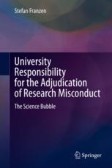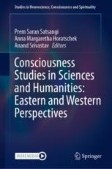Search
Search Results
-
Sloppy Models, Renormalization Group Realism, and the Success of Science
The “sloppy models” program originated in systems biology, but has seen applications across a range of fields. Sloppy models are dependent on a large...

-
Revisiting Accepted Science: The Indispensability of the History of Science
My theses are synopsized in my title, so let me begin by expanding on it, starting with the subtitle. The main point of the paper is to argue for the...
-
The Hows and whys of philosophy of science teaching: a comparative analysis
What makes teaching philosophy of science to non-philosophy students different from teaching it to philosophy students, and how should lecturers in...
-
Bursting the Science Bubble
The objective of future policy initiatives should be to put investigations of falsification or fabrication on a scientific footing. Universities...
-
Ethical Issues in Social Science Research Employing Big Data
This paper analyzes the ethics of social science research (SSR) employing big data. We begin by highlighting the research gap found on the...
-
How Competition for Funding Impacts Scientific Practice: Building Pre-fab Houses but no Cathedrals
In the research integrity literature, funding plays two different roles: it is thought to elevate questionable research practices (QRPs) due to...
-
Rethinking success, integrity, and culture in research (part 2) — a multi-actor qualitative study on problems of science
BackgroundResearch misconduct and questionable research practices have been the subject of increasing attention in the past few years. But despite...

-
Trust and professionalism in science: medical codes as a model for scientific negligence?
BackgroundProfessional communities such as the medical community are acutely concerned with negligence: the category of misconduct where a...
-
Researchers’ perceptions of research misbehaviours: a mixed methods study among academic researchers in Amsterdam
BackgroundThere is increasing evidence that research misbehaviour is common, especially the minor forms. Previous studies on research misbehaviour...

-
Reconstructing rational reconstructions: on Lakatos’s account on the relation between history and philosophy of science
In this paper, I argue that Imre Lakatos’s account on the relation between the history and the philosophy of science, if properly understood and also...
-
The Short Path from Wishful Thinking to Scientific Fraud
Scientists have the same weaknesses and temptations as people in any other line of work. One could argue that scientists require a stronger moral...
-
Medical conspiracy theories: cognitive science and implications for ethics
Although recent trends in politics and media make it appear that conspiracy theories are on the rise, in fact they have always been present, probably...
-
Introduction: Scientific Integrity and Institutional Ethics: Challenges and Perspectives
Scientific integrity corresponds to a pattern of conduct in research characterized by the observance and promotion of ethical and deontological...
-
The Modelling Supremacy of the Topological Graph Theoretic Models and Connections to Biology
This chapter is in two parts: the first part summarizes the talks delivered at the Dayalbagh Science of Consciousness series of conferences in 2019,...
-
Professionalism in Science: Competence, Autonomy, and Service
Some of the most significant policy responses to cases of fraudulent and questionable conduct by scientists have been to strengthen professionalism...

-
Mathematics and Experience
The question of whether mathematics depends on experience, including experience of the external world, is problematic because, while it is clear that...
-
Doctrines of the Association of Ideas in Early Modern Thought
We examine the doctrine of the association of ideas in early modern thought, as linked both to empiricism, to the emergence of psychology as a...
-
Various Forms of Irresponsible Research Practice
The research organizations are responsible for reacting to and investigating irresponsible research practices committed by their own employees. In...
